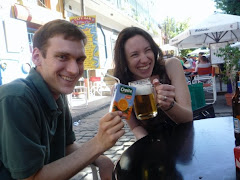While we're in the classroom, then, Sam and I will always work with a "counterpart," one of the local teachers. We are supposed to team teach, lesson plan together, collaborate on grading the students and generally work together on all aspects of teaching and the school year. Many PCVs also work with their counterparts on "secondary projects," those projects that are not directly related to the "primary project" (teaching English in the school). Some volunteers have worked with their counterparts to have students participate in after-school English conversation clubs, to work on writing grants to fix up or improve the school's bathroom facilities, to start some sort of athletic club, or on some other project. Counterparts are important to the PCVs not only as guides in the school, but also in the community, introducing us to others, helping us navigate language or cultural barriers, and giving us a nice chance to speak our native language with someone else for a while.
Because counterparts are so critical to the success of us education PCVs, we get the chance to choose which counterpart we want to work with (in some schools in smaller villages or towns, some volunteers only have one counterpart with whom to work; usually this works out ok, though, since that usually means that that counterpart is the one who filled out the application for a volunteer and truly wants them to be there). In order to know who to work with, Sam and I will be observing classes for the first two weeks. We'll get a chance to see what methodologies and strategies and activities the teachers use, the level of the students, which grades are best- (and worst-) behaved. We'll (hopefully) get a feel for which teachers want to work with us and with which teachers we would work best. We will be able to decide which age group we'd like primarily like to work with.
Georgian school students, according to recent reforms by the Georgian Ministry of Education, are supposed to start learning English this year in from the third grade. By 2012, they should all begin studying English from first grade. Previously, during Soviet times and until the very recent past, most school students studied German as their foreign language (their third language, usually, since kids tended to have their native language as their language of instruction and studied Russian each year as well). English is quickly supplanting Russian in Georgia, though, and fewer students are studying Russian as seriously. The decline of Russian in Georgia is especially pronounced in Georgian communities. In minority communities (of Armenians, like in Akhalkalaki, or of Azeris, like in Kelsey's village), Russian still has a stronger foothold. Our town has very strong Russian skills, most likely due almost entirely to the presence of a Russian military base that functioned here until January 2008. With so many native Russian speakers in town, it just made a lot of sense for all of the signs to be written in multiple languages (Russian and Armenian, sometimes with Georgian as well) and it kept up the population at the Russian schools (there used to be two Russian schools in town when the base was open). We've seen from our summer camps that kids still speak Russian, some better than others, but all better than any of the kids in our training village of Kortaneti.
Once school officially starts later this week, we'll share some more stories about how things go.
But before signing off on this post, I have one more fun story to share. I had another brush with "fame" here in Georgia this past week. The woman who authors the English textbook most commonly used in Georgian schools called Peace Corps and asked for 4 volunteers to help record dialogues in English for the CDs that will accompany the newest edition of her books. I was one of the lucky chosen and spent last Monday in Tbilisi in a little blue recording studio, reading the part of "Sopo" for the latest edition of "2000 Plus" for 5th grade students. It was a crazy trip. Some of my memorable lines included telling "Irakli" that he couldn't sign up for wrestling at school because he is too skinny; reciting a recipe for deviled eggs; correcting "Luka's" abysmal geography; and, with all the volunteers, chanting a multiplication table. I'm sure that now, with this new edition, all the kids in Georgia will become better speakers of English. I'll be scouring the bookstores now, trying to grab a copy to show off my new-found fame.
"Tatia," "Luka" and "Irakli" getting into character

The sound technician starting things off

The world-famous (or at least Georgia-famous) Tatiana Bukia, directing the dialogues





I'm working on the "Go, Sopo, Go!" shirts as we speak!
ReplyDelete